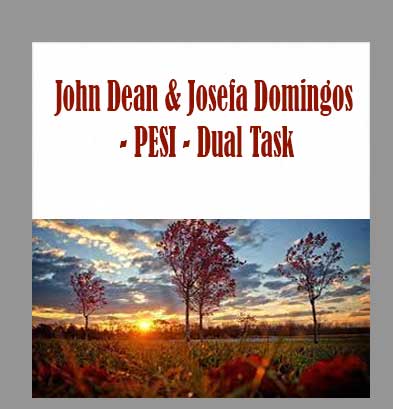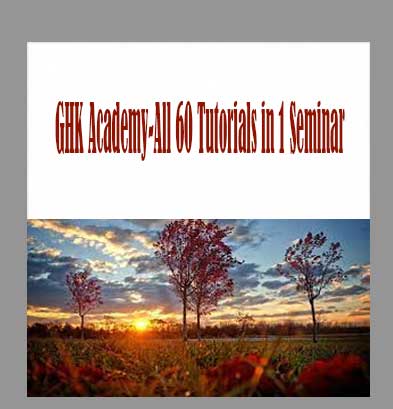Description
John Dean & Josefa Domingos – PESI – Dual Task Training for Neurological Disorders: Practical Techniques for Rapidly Improving Cognition, Communication & Motor Function download, John Dean & Josefa Domingos – PESI – Dual Task Training for Neurological Disorders: Practical Techniques for Rapidly Improving Cognition, Communication & Motor Function review, John Dean & Josefa Domingos – PESI – Dual Task Training for Neurological Disorders: Practical Techniques for Rapidly Improving Cognition, Communication & Motor Function free
John Dean & Josefa Domingos – PESI – Dual Task Training for Neurological Disorders: Practical Techniques for Rapidly Improving Cognition, Communication & Motor Function
Dual Task Training for Neurological Disorders: Practical Techniques for Rapidly Improving Cognition, Communication & Motor Function
Speakers: Josefa Domingos, MSc, Physio | John Dean, MA, CCC-SLP
Duration: 6 Hours 32 Minutes
Format: Audio and Video
Description
There’s no greater triumph than seeing your patients regain their functional independence, especially when you’ve played a pivotal role in their progress.
But when you’re working with patients who are older or affected by movement/neurological disorders, neuromotor deficits often impede progress, interfering with functional multitasks, such as walking while talking, that combine cognition, communication, and motor function.
This can drag therapy to a crawl, limit your clinical effectiveness, and cause a variety of setbacks, including:
- Falls
- Communication deficits
- Poor executive function
- Memory/attention issues
- Task avoidance
- Difficulty performing ADLs
- Functional codependence
- Gait and balance problems
- Anxiety, frustration and depression
- Apathy and isolation
Without intervention, these patients often become resigned to living life in slow motion, limited to basic tasks and always feeling a step behind in their work, home and community. But with the latest advances in dual-task training, you can change this.
Let Physiotherapist Josefa Domingos and Speech-Language Pathologist John Dean be your guides to success as they walk you through practical applications of dual-task training for your patients.
Learn how to unmask deficits that are secretly plaguing progress, integrate dual-task interventions into both therapy and daily life, and rapidly improve performance of functional activities between therapy sessions.
Speakers
Josefa Domingos, MSc, Physio
Josefa Domingos, MSc. Physio, has specialized in the treatment of Parkinson’s and related disorders for the past 15 years. She maintains a full clinical practice and serves as the national healthcare coordinator for the APDPk (Portugal’s premier Parkinson’s advocacy organization). She travels internationally to speak on topics related to dual-task training and neurological rehabilitation.
In addition, she is completing a PhD at Radboud University in the Netherlands, under the supervision of Professor Dr. Bas Bloem. Her research focuses on the development of multitask community programs for Parkinson’s, highlighting the importance of physiotherapy and other expert clinical input in the design and performance of community exercise activities.
Speaker Disclosures:
Financial: Josefa Domingos has employment relationships with Portuguese Parkinson Disease Patient Association and Radboud University. She receives a consulting fee from Bial Pharmaceutical. Josefa Domingos receives a speaking honorarium from PESI, Inc.
Non-financial: Josefa Domingos is Rehabilitation Coordinator of the Portuguese Movement Disorders Medical Society, a member of the Scientific Board of the Portuguese Gerontology Society and of the scientific committee of the European Parkinson disease Association.
John Dean, MA, CCC-SLP
John Dean, MA, CCC-SLP, has been specializing in the treatment of Parkinson’s and related disorders since 2007. In addition to clinical work, he has been involved in an array of Parkinson’s-related projects ranging from the development of interdisciplinary Parkinson’s rehab networks for a large healthcare company, founding startups that build technologies for people living with Parkinson’s and even a stint as a member of the senior leadership at the Davis Phinney Foundation.
John currently divides his time between Lisbon and Colorado, collaborating with physiotherapist Josefa Domingos to develop exercise activities that combine movement, voice, and cognition, as well as running a startup that creates technologies to help scale up dual-task training for patients around the world.
Speaker Disclosures:
Financial: John Dean maintains a private practice. He receives a speaking honorarium and recording royalties from PESI, Inc. He has no relevant financial relationships with ineligible organizations.
Non-financial: John Dean serves on the scientific advisory board for the Davis Phinney Foundation and is committee chair for the International Parkinson and Movement Disorder Society. He is a member of the American Speech Language Hearing Association and the International Parkinson and Movement Disorder Society.
Objectives
- Explain the latest advances in dual-task training and their implications for your patients.
- Demonstrate a comprehensive assessment, identifying and differentiating causes of disability and impairment.
- Integrate dual-task exercises into interventions to improve performance in functional daily life activities.
- Combine multiple approaches for better outcomes, including dual-task training, voice and communication therapies, cognitive activities, ADL training, exercise, and amplitude-based approaches.
- Evaluate real-world applications for a wide range of movement and neurological disorders.
- Apply the assessments and interventions discussed in this seminar to a series of interactive case studies.
Outline
Hot Topics and Innovations
- Current concepts of dual-task training
- Cutting edge clinical and research applications
- Rapidly evolving tech landscape
- Apps
- Smart speakers
- Wearables
Confidently Identify the Underlying Cause of Impairment
- Learn a comprehensive framework for assessing:
- Interference of cognition in movement
- Gait problems
- Falls and balance
- Cognitive problems
- Memory
- Attention
- Executive function
- Communication deficits
- Difficulties with daily activities
- Dressing and bathing
- Cleaning and cooking
- Technology (e.g. computer, phone)
- Transfer issues
- Fatigue, anxiety and depression
- Interference of cognition in movement
- Hands-on Lab
Upgrade Your Rehab Toolbox With the Latest Dual-Task Training Methods
- Cutting-edge techniques to:
- Increase dual-task performance in daily life activities
- Boost cognition, communication, and social interaction
- Challenge, motivate and engage patients
- Enhance gait speed, rhythm, and stride length
- Prevent falls and improve balance
- Enhance carryover outside of the treatment room
- Improve posture
- Restore functional independence
- Reduce load and stress on caretakers
- Hands-on Lab
Combine Multiple Approaches for Better Outcomes
- Synergistic strategies for effectively integrating:
- Dual-task training
- Voice and communication therapies
- Cognitive activities
- ADL training
- Amplitude-based approaches
- Exercise-based interventions
- Dance
- Boxing
- Hydrogymnastics/hydrotherapy
- Pole walking
- Balance training
- Hands-on Lab
Real World Applications for Common Diagnoses and Conditions
- Parkinson’s disease
- Progressive supranuclear palsy
- Multiple system atrophy
- Corticobasal ganglionic degeneration
- Huntington’s disease
- Stroke
- Brain injury
- Dementia
- Mild cognitive changes related to:
- Medications
- Previous injuries
- “Chemo brain”
- Indications, contraindications, and limitations of research
- Hands-on Lab
Improvise Solutions Using Your New Dual-Task Training Skills
- Case study: Correctly identify the underlying causes of impairment when the patient’s deficits do not readily appear on standardized assessments
- Case study: Use dual-task training to replicate daily activities and improve carryover in the home environment
- Case study: Incorporate everyday tech into practice, using apps and online resources
- Case study: Develop a transdisciplinary treatment plan for a patient with Parkinson’s
- Case study: Overcome barriers to effective strategy implementation
Target Audience
- Physical Therapists
- Physical Therapist Assistants
- Occupational Therapists
- Occupational Therapy Assistants
- Speech Language Pathologists
- Athletic Trainers
- Activity Professionals
- Nurses
- Nurse Practitioners
Frequently Asked Questions:
- Innovative Business Model:
- Embrace the reality of a genuine business! Our approach involves forming a group buy, where we collectively share the costs among members. Using these funds, we purchase sought-after courses from sale pages and make them accessible to individuals facing financial constraints. Despite potential reservations from the authors, our customers appreciate the affordability and accessibility we provide.
- The Legal Landscape: Yes and No:
- The legality of our operations falls into a gray area. While we lack explicit approval from the course authors for resale, there’s a technicality at play. When procuring the course, the author didn’t specify any restrictions on resale. This legal nuance presents both an opportunity for us and a boon for those seeking budget-friendly access.
- Quality Assurance: Unveiling the Real Deal:
- Delving into the heart of the matter – quality. Acquiring the course directly from the sale page ensures that all documents and materials are identical to those obtained through conventional means. However, our differentiator lies in going beyond personal study; we take an extra step by reselling. It’s important to note that we are not the official course providers, meaning certain premium services aren’t included in our package:
- No coaching calls or scheduled sessions with the author.
- No access to the author’s private Facebook group or web portal.
- No entry to the author’s exclusive membership forum.
- No direct email support from the author or their team.
We operate independently, aiming to bridge the affordability gap without the additional services offered by official course channels. Your understanding of our unique approach is greatly appreciated.
- Delving into the heart of the matter – quality. Acquiring the course directly from the sale page ensures that all documents and materials are identical to those obtained through conventional means. However, our differentiator lies in going beyond personal study; we take an extra step by reselling. It’s important to note that we are not the official course providers, meaning certain premium services aren’t included in our package:
Refund is acceptable:
- Firstly, item is not as explained
- Secondly, Item do not work the way it should.
- Thirdly, and most importantly, support extension can not be used.
Thank you for choosing us! We’re so happy that you feel comfortable enough with us to forward your business here.








Reviews
There are no reviews yet.